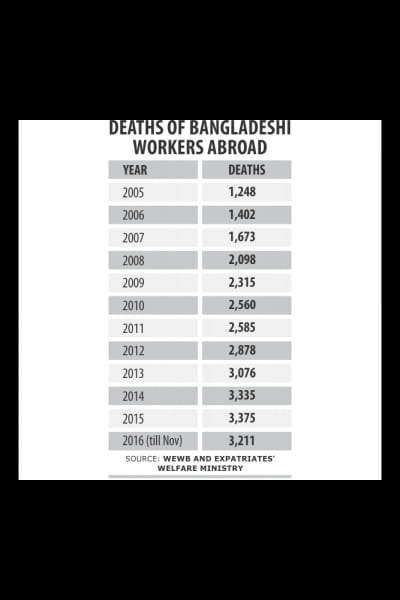Rising deaths abroad raising concerns

Five years back, Nazrul Islam from Munshiganj took a Tk 5-lakh loan from a local bank and ventured out to Malaysia where many Bangladeshis have tried their luck over the years.
Nazrul, a father of two children, got a job at a plastic factory in southern Selangor province of the Southeast Asian country.
But he had a hard time earning money. The wage was too low to meet his basic needs, forcing him to work extra hours.
As Nazrul had no other source of income back home to run a family of four in Munshiganj's Rampal, he worked 12 hours a day and skipped visiting his family for around five years only to make ends meet.
In October this year, Nazrul decided to take a trip home.
But tragedy struck the family just five days before his scheduled return on October 31.
Nazrul, who was in his early 40s, died of a heart attack at his workplace in Malaysia. His body was brought home on October 30, and he was buried in Munshiganj the following day.
“He was very worried about paying off his loan and the future of our two children,” said Nazrul's wife Sonia Akhter.
“Our dreams have been shattered. We have no words to share our loss with anyone. Our lives are now in disarray.”
With the lone breadwinner of the family gone, Sonia has no idea how she would move on with her eight-year-old son and six-year-old daughter.
DEATHS OF MIGRANT WORKERS
If the statistics of the Wage Earners Welfare Board (WEWB) are something to go by, Sonia is not the only one at the receiving end of such tragedy.
According to the WEWB, around 3,000 other Bangladeshi families had lost their loved ones working in foreign labour markets between January and November this year.
And most of these workers were below 40 and the causes of their deaths, predominantly, were either stroke or heart attack.
Last year, at least 3,375 bodies of Bangladeshi migrant workers were brought home from Saudi Arabia, Malaysia, the United Arab Emirates and several other countries, says the WEWB.
Over the last one decade, the number of deaths of Bangladeshi migrants abroad rose every year.
Bangladeshi workers, who spend huge sums to get jobs abroad, go through a lot of physical and mental sufferings due to low income, debt originating from high costs of migration and hostile workplaces on foreign soil. The lack of medical care and a balanced diet adds to their sufferings, say migrant rights activists.
Voicing concern over the deaths of so many Bangladeshis abroad, migrant rights activists have demanded probes into these untimely deaths.
Colin Rajah, an internationally acclaimed migrant rights activist, said it's very important to push the host countries to ensure the rights of migrant workers.
“Bangladeshi migrant workers abroad face a lot of repression by unscrupulous employers and recruiters because the host countries are not protecting their rights,” said Rajah, who has been fighting for migrant rights for nearly three decades.
Jabed Ahmed, additional secretary at the expatriates' welfare and overseas employment ministry, said no decision has been made yet on probing the deaths of migrant workers aboard.
He said they were taking some measures to ensure safety of migrant workers.
In a statement on December 9, Human Rights Watch said Bangladesh should ensure that it provides the highest protection to its workers abroad by increasing oversight over its own recruitment agents, offering protections for its workers in host countries, and aiding workers in distress.
Bangladesh should also ratify the International Labour Organization's Domestic Workers Convention, a treaty that requires countries of origin to cooperate with other countries to ensure protection of migrant domestic workers and to take measures to prevent abuse and fraudulent practices in recruitment, placement, and employment, it added.

 For all latest news, follow The Daily Star's Google News channel.
For all latest news, follow The Daily Star's Google News channel. 



Comments